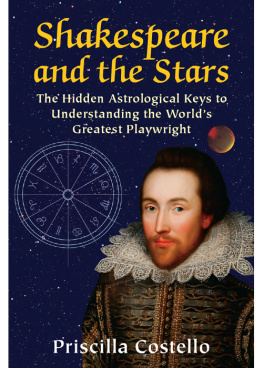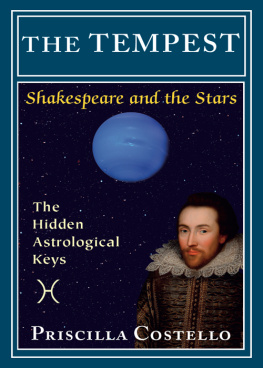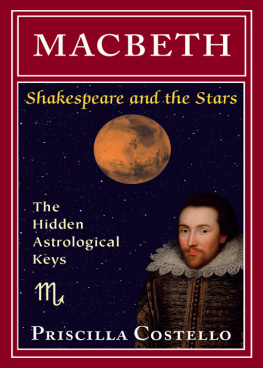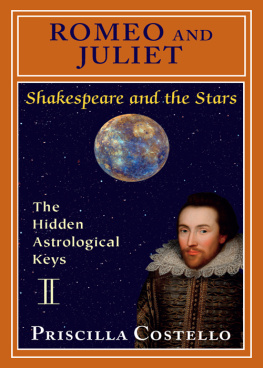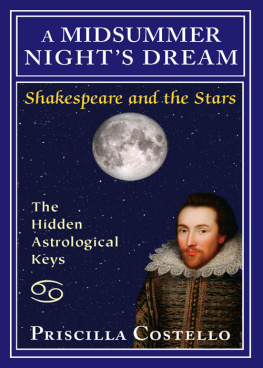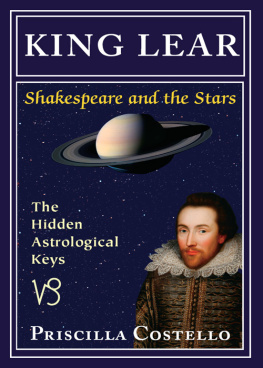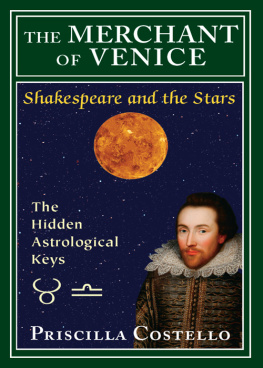Praise for Shakespeare and the Stars
The truth is now obvious: Shakespeare's worldview was essentially identical with the occult philosophy of the Renaissance. Anyone who doubts this fact should read this exciting, revelatory, and authoritative new book. It will help you understand Shakespeare in a totally fresh and insightful way.
Richard Smoley, author of Inner Christianity: A Guide to the
Esoteric Tradition
A book that will carry you beyond the stars into the heart of the cosmos. In Shakespeare and the Stars, Priscilla Costello recreates the ancient cosmological view of the heavens, infuses it with elements of the western mystery tradition that pose the interconnectedness of above and below where the mythic attributes of planetary deities are the archetypes for human personality.
Then through this profound philosophical lens, she looks at six of Shakespeare's plays with meticulous precision, offering the secret key to unlock the deeper significance of his work.
This book is much more than a new analysis of Shakespeare's work; it is an illumination of the cosmic vision that informed his creative outpouring.
Demetra George, M.A., author of Astrology for Yourself
In this extraordinary book Priscilla Costello brings a new and surprising perspective to our reading of Shakespeare. We discover the eternal symbols and archetypes in his characters and plays seen through the lens of astrological signs and planets. In turn, astrology is similarly enriched by the master of Western literature where his creative genius gives life, story and character to the planets and signs.
Ami Ronnberg, Director and Head Curator, Archive for
Research in Archetypal Symbolism (ARAS) at the C. G. Jung
Center in New York City
This wonderful book brings together everything I have ever held dear in life. Priscilla Costello's profound study is a substantial, scholarly work that is also completely accessible. The author knows her subject inside out andeven more importantlyshe has the ability to convey her knowledge in a way that is constantly stimulating for her readers. We are both educated and entertained.
This book inspires me to re-visit the plays, especially the ones she has analysed in depth. Having absorbed this superb study of Shakespeare's world, I feel armed with fresh insights, and will experience his plays in an entirely new way. Riches lie in store. Four hundred years on, Shakespeare himself would be applauding.
Lindsay Radermacher, MA Oxon (English), MPhil,
professional astrologer (DFAstrol S.), Trustee of the Sophia
and Urania Trusts
Priscilla Costello's groundbreaking book Shakespeare and the Stars will finally put to rest the question as to whether the greatest playwright who ever lived consciously alluded to astrology throughout his writings. The detailed and thoroughly researched examples that Costello provides will leave no doubt that the Bard utilized astrology to show how the fate of humankind is left less to chance than we would like to believe.
Costello's knowledge and love of both astrology and Shakespeare make this book a classic which, like the Bard's plays, will be read and re-read for years to come.
Ronnie Gale Dreyer, M.A., author of Vedic Astrology and Venus
LINES FROM THE BARD
... a good heart, Kate, is the sun and the moon; or rather the sun and not moon; for it shines bright and never changes, but keeps his course truly.
Henry V to Princess Katharine of France (Henry V: V, ii, 1569)
It is the very error of the moon:
She comes more nearer earth than she was wont,
And makes men mad. (Othello: V, ii, 11820)
I know thy constellation is right apt
For this affair. (Twelfth Night: I, iv, 345)
It is the stars,
The stars above us, govern our conditions;
Else one self mate and make could not beget
Such different issues. (King Lear: IV, iii, 314)
... there was a star danced, and under that was I born.
(Much Ado About Nothing. II, i, 2934)
Comets, importing change of times and states,
Brandish your crystal tresses in the sky ...
(I Henry VI: I, i, 23)
But when the planets
In evil mixture to disorder wander,
What plagues and what portents, what mutiny?
What raging of the sea! shaking of earth?
(Troilus and Cressida: I, iii, 947)
There is a tide in the affairs of men
Which, taken at the flood, leads on to fortune;
Omitted, all the voyage of their life
Is bound in shallows and in miseries.
On such a full sea are we now afloat,
And we must take the current when it serves
Or lose our ventures. (Julius Caesar: IV, ii, 2706)

Published in 2016 by Ibis Press
A division of Nicolas-Hays, Inc.
P. O. Box 540206
Lake Worth, FL 33454-0206
www.ibispress.net
Distributed to the trade by
Red Wheel/Weiser, LLC
65 Parker St. Ste. 7
Newburyport, MA 01950
www.redwheelweiser.com
Copyright 2016 by Priscilla Costello
All rights reserved. No part of this publication may be reproduced or transmitted in any form or by any means, electronic or mechanical, including photocopying, recording, or by any information storage and retrieval system, without permission in writing from Nicolas-Hays, Inc. Reviewers may quote brief passages.
ISBN 978-0-89254-216-1
Ebook: ISBN 978-0-89254-631-2
Library of Congress Cataloging-in-Publication Data
Available upon request
Book design and production by STUDIO 31
www.studio31.com
Cover painting: the Cobbe portrait, ca. 1610
Smile retouch by Mimi Alonzo
Cover design by STUDIO 31
Printed in the United States of America
[MG]
www.redwheelweiser.com
www.redwheelweiser.com/newsletter
TABLE OF CONTENTS:
The Story
INTRODUCTION
... by my prescience
I find my zenith doth depend upon
A most auspicious star, whose influence
If now I court not, but omit, my fortunes
Will ever after droop.
Prospero (The Tempest: I, ii, 1815)
[NOTE: Italics in quotations are in all cases added for emphasis unless otherwise noted.]
I n Shakespeare's time, this speech had a meaning entirely missed by modern audiences: they knew that Prospero's most auspicious star had to be Jupiter, the greater benefic, considered throughout western cultural history to be the bringer of success and prosperity. These lines signal that the play is a comedy since it implies that the hero's fortunes are on the rise. Knowing that Jupiter has a twelve-year cycle (it takes twelve years to circle the Sun as viewed from Earth), the spectators of Shakespeare's time also got the significance of Prospero's twelve-year exile on the island: with one revolution of Jupiter completed and another beginning, his luck is about to change.
This is only one of dozens of references to the astrological language in Shakespeare's works. Modern audiences may be surprised at the frequency of such allusions since astrology has been marginalized in our day, but the audiences of Shakespeare's time were steeped in its language, partly because the people of his time were more aware of and attuned to the skies than ours: Poets wrote of the wonder of the heavens, mariners steered by the stars, shepherds found their clock in the skies, farmers worked by the weather portents. All and sundry were astronomers in a greater or less degree ... Since only very wealthy Elizabethans would have owned clocksand they were known to be unreliableif you wanted to know the time of day, you might listen for church bells, or find a sundial, or just look outside to check the angle of the Sun.

